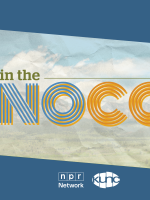For many people, being stopped by police can produce a wave of anxiety. But that sense of stress and uncertainty is even worse for people with conditions like autism spectrum disorder, hearing loss, Tourette’s syndrome, or dementia.
Boulder’s Police Department recently rolled out a new initiative called the to help people with disabilities communicate when they encounter an officer.
It allows a person to get an official blue envelope and fill it out with information that an officer might need to know to communicate with them. Then if they’re stopped by Boulder Police, they hand over the envelope.
The program is used by agencies in a handful of states, but Boulder’s Blue Envelope Program is the first in Colorado. Alistair McNiven, Chief of Staff for Boulder Police, helped launch the program in January. He spoke with Erin O’Toole about why he thinks the envelopes may be a transformative tool for law enforcement.
McNiven said people can email BlueEnvelope@bouldercolorado.gov to request a blue envelope, or go to the front desk of the Boulder Police Department.









